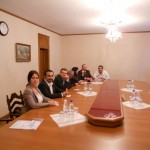On September 23-25 in Chisinau (Moldova) there were meetings of the experts of project “Competition of Geopolitical Interests in the Post-Soviet Space: Future Prospects for the EaP Countries” (the Project was supported by East-East: Partnership Beyond Borders Program of Soros Moldova) with the high ranking Moldovan policy and decision-makers supplemented by study visit to Gagauz Yeri and followed by the respective round table.
The experts met with Head of Department of MFA of Moldova Daniela Cujba, Head of Department of Ministry of Economics Inga Ionesii, Political Officer of the OSCE Mission to Moldova Lyndon Allin, Speaker of the Speaker Parliament of the Republic of Moldova, Governor of Autonomous Territorial Unit Gagauz Yeri Mihail Formuzal, Vice-Prime-Minister for Reintegration of Moldova Eugen Carpov. The event key-note speakers were Oazu Nantoi and Arcadie Barbarosie from IPP (Chisinau, Moldova), Sergiy Gerasymchuk from Strategic and Security Studies Group (Kyiv, Ukraine), Victor Chirila and Radu Vrabie from APE (Chisinau, Moldova).
The key issues addressed by the participants of the meetings and the round table were the following: geopolitical competition in post-Soviet space, progress in implementing reforms, prospects of signing Association Agreement by the EaP countries, the impact of Transnistrian conflict on the political situation in Moldova, the role and the leverages obtained by the participants of 5+2 format. The common feature underlined by the participants of the Project was the lack of institutional capacities of EaP countries, vulnerability towards Russian pressure rooted in the attempts of Moscow to prevent further cooperation of EaP countries and development of their political and economic cooperation. The participants also emphasized that Russian soft power (soft preassure) is being applied in the EaP countries within the same patterns.
Moldovan experts also noted politicized position of Transnistria. For example the representative of Tiraspol participated at DFTA negotiations as a observer, however neither this fact nor readiness of the EU to extend regime of autonomous preferences till 2015 do not persuade Tiraspol to support closer relations of Moldova and the EU. At the same time provisions of DCFTA and Association Agreement cannot be applied only to the part of the Republic of Moldova which leads the situation to the dead end.
The experts also discussed Ukraine’s chairmanship at OSCE and the impact of the status of the chairing country on the process of Transnistrian problem settlement. The experts noted that during the year there was a strong resistance towards implementation of Ukraine’s priorities. There is no progress in settlement process, Odesa meeting of leaders of Moldova and Transnistria was cancelled due to the efforts of Transnistrian and Russian side and there is also a threat of provocations in the “security zone”.
There is also number of problems in relations of Chisinau with Gagauz autonomous unit. For example, in Gagauz-Yeri there is an opinion that the fact of non-involvement of bashkan of Gagauzia in drafting the Association agreement alongside with the loss of Russian market will cause negative consequences for the autonomous unit. Although notwithstanding the fact that it was Gagauzia that that suffered most in result of Russian embargo on Moldovan wines its leader Mikhail Formuzal blames for that Moldovan authorities and corrupted Moldovan political system.
At the concluding roundtable the problems that EaP countries face on their eurointegration path were discussed. The key tasks are democracy promotion, combating corruption, modernization of economics, counterweighing the problem of Russian imposed “russkiy mir” policy and the respective geopolitical voluntarism.
The participants of the round table emphasized the necessity of consolidation of pro-European and pro-democratic civil society of EaP countries, strengthening of its impact on the decision-making both in EaP countries and in Brussels. Also it was noted that no less important task comparing to the European integration is reducing the influence of Moscow on the internal politics within EaP countries. The experts believe that it is necessary to put the question of Russian policy in Eastern Europe and in the Caucasus on the European top agenda, to expose its neo-imperial and revanchist origin.
Except for the Moldovan experts the participants of the round table also were from Armenia: Sergey Chamanyan, Azerbaijan: Togrul Juvarly, Georgia: Nino Samvelidze, Marine Solomonishvili, Nikoloz Sumbadze, Ukraine: Sergiy Gerasymchuk, Volodymyr Gorbach, Yaroslav Matiychyk.
Grounding on the study visit the experts of IPP (Chisinau, Moldova) and Strategic and Security Studies Group (Kyiv, Ukraine) will prepare a Policy Paper which will be presented in Chisinau and Kyiv in November 2013 before the Vilnius summit.
